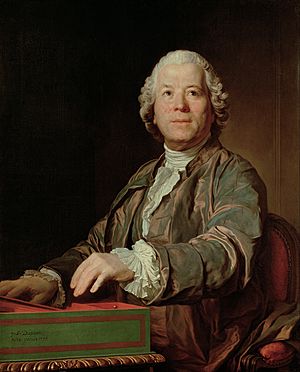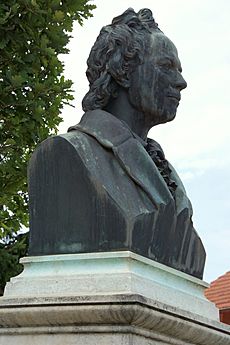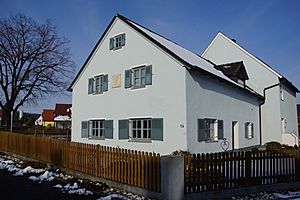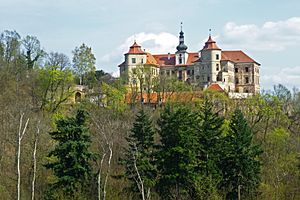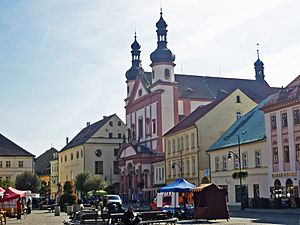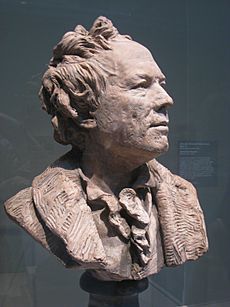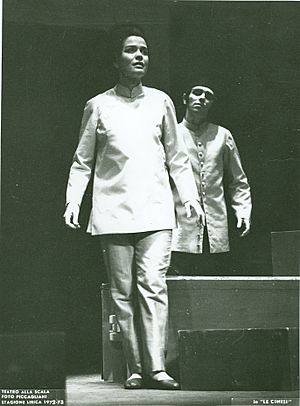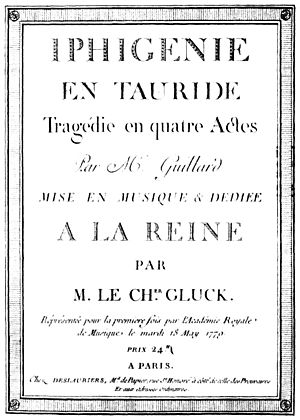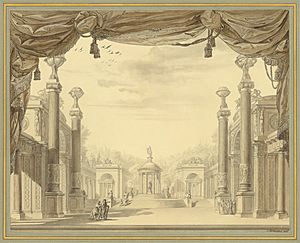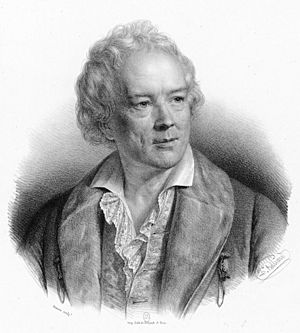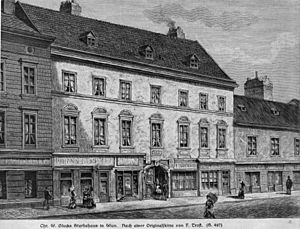Christoph Willibald Gluck facts for kids
Christoph Willibald Gluck (born July 2, 1714 – died November 15, 1787) was a very important composer of operas in the early Classical music period. He wrote both Italian and French operas.
Gluck was born in a region called the Upper Palatinate and grew up in Bohemia, which were both part of the Holy Roman Empire. He became famous at the royal court in Vienna, where the Habsburg family ruled.
He changed opera a lot, making it more dramatic and exciting. He used music to tell stories better, especially with works like Orfeo ed Euridice and Alceste. Gluck made operas shorter and more focused on the story, moving away from the very long and fancy style that was popular before him. Many famous composers who came after him, like Mozart and Wagner, looked up to Gluck.
Gluck was also very interested in French opera. In 1773, he moved to Paris. There, he mixed the styles of Italian and French opera, adding big choruses and creating something new. He wrote eight operas for the Paris stage. His opera Iphigénie en Tauride (1779) was a huge success and is often considered his best work. Even though he was very popular, he left Paris after one of his operas, Echo et Narcisse (1779), was not well received. He returned to Vienna and lived there for the rest of his life.
Contents
Gluck's Life and Musical Journey
Early Years and Family History
Christoph Willibald Gluck's family came from Bohemia. His great-grandfather, Simon Gluckh, is the earliest known ancestor. The family name, Gluck, might come from the Czech word for boy, kluk. Many of Gluck's male relatives, including his father Alexander, worked as foresters or gamekeepers.
Gluck's father, Alexander, was born in 1683. He worked for important families and even served in the army for a short time. In 1711, he became a forester near Berching. Gluck's mother was Maria Walburga, but not much is known about her. They likely married around 1711. In 1713, Alexander built a house in Erasbach, where many believe Christoph was born.
Gluck himself said he was born on July 2, 1714. He was baptized on July 4, 1714, in the village of Weidenwang. He was given the name Christophorus Willibaldus. However, Gluck never used the name Willibald himself. Scholars in the 1800s started using "Willibald" to tell him apart from another family member.
When Gluck was young, his family moved several times because of his father's jobs. In 1717, they moved to Reichstadt, and in 1722, to Böhmisch Kamnitz. Finally, in 1727, they settled in Eisenberg.
Learning Music in Prague
Around 1727 or 1728, when Gluck was about 13 or 14, he went to Prague. Some stories say he ran away from home and earned money by singing, but it's more likely he went to Prague to study.
In Prague, Gluck may have studied at the University. Prague had a lively music scene with many operas and oratorios (musical stories without acting). Gluck sang and played the violin, cello, and organ. He played the organ at the famous Týn Church.
After leaving Prague, Gluck's life is a bit of a mystery until 1737. It is thought he worked for the Lobkowitz family in Vienna from 1735 to 1736. This family might have introduced him to Prince Antonio Maria Melzi, who hired Gluck to play in his orchestra in Milan.
Gluck's Time in Italy
In 1737, Gluck arrived in Milan, Italy. There, he met Giovanni Battista Sammartini, a famous composer who taught Gluck a lot about musical instruments. Milan was a big center for opera, and Gluck soon started working with the Teatro Regio Ducale opera house.
His first opera, Artaserse, was performed on December 26, 1741. It was part of the Milanese Carnival season. Some stories say the audience didn't like his style at first until he added a lighter song. However, he continued to write an opera for each of the next four Carnivals in Milan, so his work must have been quite popular. He also wrote operas for other Italian cities like Turin and Venice. Most of his operas during this time used texts by the poet Pietro Metastasio, even though Metastasio didn't always like Gluck's music style.
Travels and New Influences
In 1745, Gluck went to London, England, to work at the King's Theatre. The timing wasn't great because of a rebellion, and the theater was often closed. He wrote two operas for London, La caduta de' giganti and Artamene, using parts from his earlier works.
More importantly, in London, Gluck heard the music of Handel, who became a big influence on his style. He also saw the natural acting of David Garrick, a famous English actor who wanted to make theater more realistic. Gluck even performed with Handel once and played a glassharmonica in a concert.
The years 1747 and 1748 brought Gluck important opportunities. He wrote an opera for a royal wedding in Pillnitz. Then, he was chosen to write an opera, La Semiramide riconosciuta, for Maria Theresa's birthday in Vienna. This opera was very popular, performed 27 times! However, the court poet, Metastasio, called Gluck's music "archvandalian," which might be why Gluck didn't stay in Vienna for long at that time. He continued to travel with opera companies, even performing his glassharmonica concert in Copenhagen.
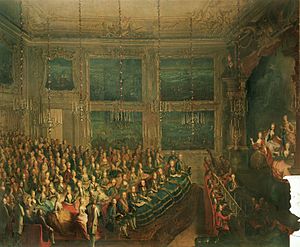
In 1750, Gluck returned to Prague more regularly. He wrote a new opera, Ezio, for the Prague Carnival. A big event that year was his marriage to Maria Anna Bergin on September 15, 1750. She was 18 and the daughter of a wealthy merchant.
In 1752, Gluck received another important job: to write an opera for King Charles VII of Naples. He chose Metastasio's La clemenza di Tito. The opera was performed on November 4, and a famous singer named Caffarelli sang a very difficult but admired song that Gluck wrote for him.
Settling in Vienna and Opera Reforms
Gluck finally settled in Vienna and became the music director (Kapellmeister) for Prince Joseph of Saxe-Hildburghausen. He wrote several works, including Le cinesi in 1754. In 1756, after his opera Antigono was performed in Rome, Pope Benedict XIV made Gluck a Knight of the Golden Spur. From then on, he used the title "Ritter von Gluck" or "Chevalier de Gluck."
Gluck started to move away from the traditional Italian serious opera (opera seria) and began writing French comic operas (opéra comiques). In 1761, he created the ballet Don Juan with choreographer Gasparo Angiolini. His comic opera La rencontre imprévue (1764) was a highlight. Around this time, Gluck started creating musical dramas based on Greek tragedy, focusing on strong emotions.
Gluck also taught music to Marie Antoinette, who later became the Queen of France. She became a good musician, playing the harp, harpsichord, and flute, and singing beautifully. Her family often played Gluck's music together.
In 1774, Marie Antoinette, now Queen, helped Gluck introduce his music to Paris. She asked him to compose a new opera, Iphigénie en Aulide, in French. Gluck was very strict in rehearsals, wanting singers and the chorus to act and be part of the drama, not just stand still. His new opera was a big success, and Marie Antoinette received much credit for supporting him.
Gluck's Big Ideas for Opera
Gluck believed that both serious and comic operas had become too artificial. He felt that the singing in serious operas was too focused on showing off, and the stories were boring. In comic operas, the jokes were old, and the characters were stereotypes. Singers often added so many fancy notes that the original melody was lost.
Gluck wanted to bring opera back to its main purpose: telling a human story and showing strong emotions. He believed the words and music should be equally important. He was inspired by Francesco Algarotti's Essay on the Opera (1755), which said that all parts of an opera – music, ballet, and staging – should serve the main drama.
In Vienna, Gluck found others who shared his ideas, like Count Giacomo Durazzo (head of the court theater) and the writer Ranieri de' Calzabigi.
The first major result of their new ideas was Gluck's ballet Don Juan. But an even more important work followed: Orfeo ed Euridice, first performed on October 5, 1762. Gluck aimed for a "beautiful simplicity" in this opera. The dances were by Angiolini, and the main role was sung by Gaetano Guadagni, who was known for his unusual acting and singing. Orfeo is still performed today and showed the start of Gluck's reforms. He wanted the drama to be more important than the star singers.
Gluck and Calzabigi continued their reforms with Alceste (1767) and Paride ed Elena (1770). They wrote a special introduction to Alceste (which Gluck signed) explaining their new rules:
- No more da capo arias (songs where the first part is repeated exactly).
- No chances for singers to show off with extra fancy notes.
- Words should be clearer and easier to understand.
- Less repetition of words in songs.
- Less difference between talking parts (recitative) and singing parts (arias).
- Music should always accompany the talking parts, not just a simple keyboard.
- Melodies should be simpler and flow better.
- The opening music (overture) should connect to the mood or story of the opera.
Gluck's Time in Paris
Since his operas weren't as popular with Frederick II of Prussia, Gluck started focusing on France. With the support of Marie Antoinette, he signed a contract to write six operas for the Paris Opéra. He started with Iphigénie en Aulide.
The first performance on April 19, 1774, caused a huge debate in Paris. People argued between "Gluckists" (who liked Gluck's style) and "Piccinnists" (who preferred the Italian composer Niccolò Piccinni). Gluck and Piccinni themselves didn't argue, but the rivalry was intense.
On August 2, 1774, a French version of Orfeo ed Euridice was performed. This time, Gluck's work was better received in Paris. That same year, Gluck returned to Vienna and was appointed composer to the imperial court. For the next few years, he traveled between Paris and Vienna.
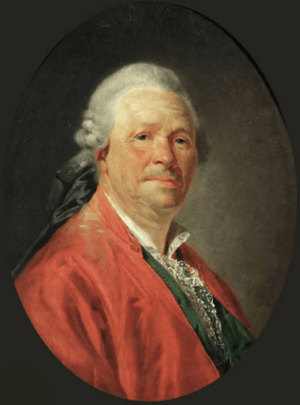
During rehearsals for his opera Echo et Narcisse in September 1779, Gluck became very ill. Since the opera was not a success, Gluck decided to return to Vienna.
Gluck's student in Paris was Antonio Salieri, who had been his protégé since 1767. Gluck brought Salieri to Paris and even gave him a libretto (the text of an opera) for Les Danaïdes. The opera was first announced as a team effort, but after its huge success, Gluck told the newspaper that the work was entirely Salieri's.
Gluck's Last Years
In Vienna, Gluck wrote a few more smaller works. He often spent summers with his wife in Perchtoldsdorf, a town known for its wine. Gluck had high blood pressure. In 1781, he released a German version of Iphigénie en Tauride, which was very popular. He also attended a concert by Mozart in 1783, where Mozart played variations on one of Gluck's tunes.
On November 15, 1787, Gluck was having lunch with friends when he suffered a heart problem and died a few hours later at the age of 73. He was buried in the Matzleinsdorfer Friedhof cemetery. Later, in 1890, his remains were moved to the Zentralfriedhof, where a special tomb was built for him. His death opened the way for Mozart to become more prominent at the court.
Gluck's Lasting Impact
Even though about half of his works were lost in a fire in 1809, Gluck left behind a huge musical legacy. This includes about 35 full-length operas, a dozen shorter operas, and many ballets and instrumental pieces.
His new ideas for opera greatly influenced composers like Mozart, especially in his opera Idomeneo (1781). Gluck also left behind many students and followers in Paris, who continued his style throughout the French Revolution and Napoleonic era. These included composers like Antonio Salieri, Cherubini, and Méhul.
One of Gluck's biggest fans was Hector Berlioz, whose epic opera Les Troyens is seen as a continuation of Gluck's style. Even though Gluck didn't write operas in German, his example influenced German opera composers like Carl Maria von Weber and Richard Wagner. Wagner's idea of "music drama" was quite similar to Gluck's own goals for opera.
|
See also
 In Spanish: Christoph Willibald Gluck para niños
In Spanish: Christoph Willibald Gluck para niños
 | Aaron Henry |
 | T. R. M. Howard |
 | Jesse Jackson |


